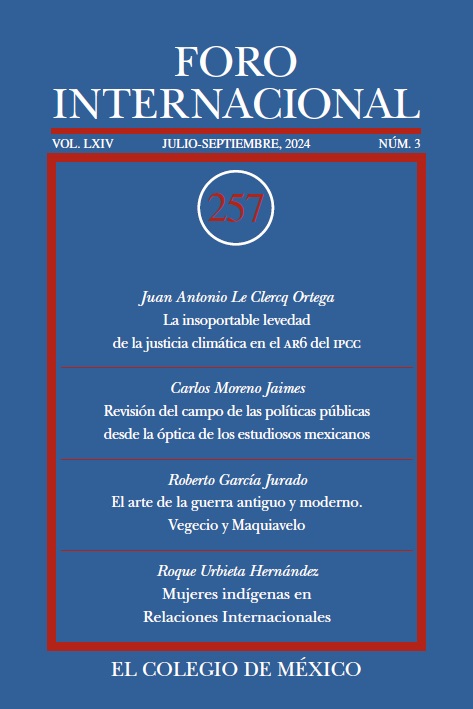Indigenous Women in International Relations
DOI:
https://doi.org/10.24201/fi.v64i3.3049Keywords:
indigenous diplomacy, institutional rituals, paradiplomacy, critical perspective, global governanceAbstract
The indigenous women’s movement in Latin America and the Caribbean in the second decade of the 20th century revolutionized the discipline of International Relations (IR), by reinterpreting the theoretical-methodological frameworks in their desire to understand the diplomatic world. From a critical perspective, Mexican indigenous women continue to demonstrate the impor tance of becoming aware of rituals as performative acts that re-signify institutional structures, norms, and order in redefining the vision of global governance. Incorporating new methodological approaches based on the ethics of care and reciprocity in violent scenarios, this article responds with the method of critical discourse analysis as speech experience and text to the question of whether indigenous women’s access to international spaces is a characterization of paradiplomacy or, rather, the “good living” of a historical moment in the emergence of indigenous diplomacy with a feminine face in a globalized world.
Downloads
References
AGUIRRE BELTRÁN, Gonzalo, Aguirre Beltrán. Obra polémica, México, Centro de Investigaciones Superiores del Instituto Nacional de Antropología e Historia, 1976.
CRENSHAW, Kimberle, “Mapping the margins: Intersectionality, identity politics, and violence against women of color”, Stanford Law Review, vol. 43, núm. 6 (1991), pp. 1241-1299, https://doi.org/10.2307/1229039 DOI: https://doi.org/10.2307/1229039
DE VIENNE, Emmanuel y Chloé NAHUM-CLAUDEL, “Anthropologie et diplomatie”, Terrain [en línea], 73|2020, https://doi.org/10.4000/terrain.19584 DOI: https://doi.org/10.4000/terrain.19542
DOUKI, Caroline y Philippe MINARD, “Histoire globale, histoires connectées: un changement d’échelle historiographique? Introduction”, Revue d’histoire moderne et contemporaine, vol. 5, núm. 54, 2007, pp. 7-21, https://doi.org/10.3917/rhmc.545.0007 DOI: https://doi.org/10.3917/rhmc.545.0007
DORSEY, Ellen, “The Global Women’s Movement: Articulating a New Vision of Global Governance”, en Paul F. Diehl (ed.), The Politics of Global Governance, Boulder, Lynne Rienner, 2001.
FONSECA Melody y Ari JERREMS, “Pensamiento decolonial: ¿una “nueva” apuesta en las Relaciones Internacionales?”, Relaciones Internacionales, vol. 19, 2012, pp. 103-121. DOI: https://doi.org/10.15366/relacionesinternacionales2012.19.005
GALEANA, Patricia (coord.), Diplomáticas mexicanas, México, Siglo XXI, 2022.
GARCÍA RAMÍREZ, Sergio, “Mujer y circunstancias. Vida y enseñanza de María Lavalle Urbina”, en Patricia Galeana (coord.), Diplomáticas mexicanas, México, Siglo XXI, 2022.
GILLIGAN, Carol, La ética del cuidado, Cuadernos de la Fundació Víctor Grífols i Lucas, núm. 30, 2013, 113 pp., https://www.revistaseden.org/boletin/files/6964_etica_del_cuidado_2013.pdf
HOOKS, Bell, Avtar BRAH, Chela SANDOVAl, Gloria ANZALDÚA, et al., Otras inapropiables. Feminismos desde las fronteras, España, Traficantes de Sueños, 2004.
JAIN, Devaki, “Women of the South. Engaging with the UN as a diplomatic manoeuvre”, en Jennifer A. Cassidy (ed.), Gender and Diplomacy, Londres, Routledge, 2017.
LAVINAS PICQ, Manuel, Vernacular Sovereignties: Indigenous Women Challenging World Politics, EE.UU., University of Arizona Press, 2018. DOI: https://doi.org/10.2307/j.ctt20krzcq
LEQUESNE, Christian, Studying diplomatic practices through the lens of direct observation (informe de investigación), SAGE Publications, 2019, https://sciencespo.hal.science/hal-01985778 DOI: https://doi.org/10.4135/9781526471789
LEQUESNE, Christian y Stéphane PAQUIN, “Federalism, paradiplomacy and foreign policy: A case of mutual neglect”, International negotiation, 22(2), 2017, pp. 183-204, https://doi.org/10.1163/15718069-22001133 DOI: https://doi.org/10.1163/15718069-22001133
LÉVI-STRAUSS, Claude, “La politique étrangère d’une société primitive”, Politique étrangère, núm. 2, año 14, 1949, pp. 139-152, https://doi.org/10.3406/polit.1949.2815 DOI: https://doi.org/10.3406/polit.1949.2815
LIGHTFOOT, Sheryl Rae, “Indigenous global politics” (tesis doctoral), EE.UU., University of Minnesota, 2009.
MAUSS, Marcel, “Essai sur le don. Forme et raison de l’échange dans les sociétés archaïques”, Année Sociologique, 1923, https://anthropomada.com/bibliotheque/Marcel-MAUSS-Essai-sur-le-don.pdf
PONIATOSWKA, Elena, “Poeta y Poesía, Rosario Castellanos”, en Patricia Galeana (coord.), Diplomáticas mexicanas, México, Siglo XXI, 2022.
RIQUELME GÓMEZ, Diego y Cristian OVANDO SANTANA, “Una aproximación de los aportes etnográficos a los estudios diplomáticos”. Colombia Internacional, núm. 112, 2022. pp. 123-152. DOI: https://doi.org/10.7440/colombiaint112.2022.05
SENDING, Ole Jacob e Iver B. NEUMANN, “Governance to Governmentality: Analyzing, NGOs, States, and Power”, International Studies Quarterly, vol. 50, núm. 3, 2006, pp. 651-672, https://doi.org/10.1111/j.1468-2478.2006.00418.x DOI: https://doi.org/10.1111/j.1468-2478.2006.00418.x
SHARP, Paul, Diplomatic Theory of International Relations, Cambridge, Cambridge University Press, 2012.
SMITH, Dorothy E., “Comment on Hekman’s ‘Truth and Method’: Feminist Standpoint Theory Revisited”, Signs, vol. 22, núm. 2 (invierno), 1997, pp. 392-398, https://www.jstor.org/stable/3175280 DOI: https://doi.org/10.1086/495164
“Soy Cielo Gómez”, Revista Casa de México, Instituto de los Mexicanos en el Exterior, 30 de agosto de 2021, https://ime.red/casa-de-mexico/2021/08/mi-ninez/
SUBRAHMANYAM, Sanjay, Aux origines de l’histoire globale, París, Collège de France/Fayard, 2014. DOI: https://doi.org/10.4000/books.cdf.3606
SUPIOT, Alain, Homo Juridicus. On the Anthropological Function of the Law, Nueva York, Londres, Verso, 2017.
TORRES CISNEROS, Gustavo A., “Diplomacia indígena: transitando del problema a la solución”, Revista Mexicana de Política Exterior, núm. 98 (2013), pp. 197-232.
TUHIWAI SMITH, Linda, Decolonizing Methodologies: Research and Indigenous Peoples, Dunedin, Nueva Zelanda, University of Otago Press, 2002.
TURNER, Víctor, From Ritual to Theatre. The Human Seriousness of Play, Nueva York, PAJ Publications, 1982.
URBIETA HERNÁNDEZ, Roque, “Des sistemas de cargos au 69e Forum de l’Assemblée Général des Nations Unies (ONU). Les expériences vécues des femmes autochtones, une perspective décoloniale de la diplomatie internationale”, América Crítica, vol. 2, núm. 2, 2018, https://dialnet.unirioja.es/servlet/articulo?codigo=8081934.
URBIETA HERNÁNDEZ, Roque, “De nouvelles hégémonies autochtones dans l’État pluriculturel de Oaxaca (Mexique): identité flexible, ventriloquie féministe et citoyennetés multiples”, Canadian Journal of Latin American and Caribbean Studies/Revue canadienne des études latino-américaines et caraïbes, vol. 45, núm. 3 (2020), https://doi.org/10.1080/08263663.2020.1769454 DOI: https://doi.org/10.1080/08263663.2020.1769454
URBIETA HERNÁNDEZ, Roque, Movimientos etnopopulistas, ventriloquía feminista y violencias. La producción de Grandes Mujeres, México, UNACH (en prensa), 2024.
VALLADARES DE LA CRUZ, L. R., “Multiculturalismo, derechos humanos y pueblos indígenas. Los derechos humanos de las mujeres indígenas: de la aldea local a los foros internacionales”, Alteridades, vol. 18, núm. 35 (2008), pp. 47-65.
VAN DIJK, Teun, “El análisis crítico del discurso”, Anthropos, 186, septiembre-octubre, 1999, pp. 23-36.
UNOKI, Ko, Racism, Diplomacy, and International Relations, Nueva York, Routledge, 2022. DOI: https://doi.org/10.4324/9781003256700
VEGA, Patricia, “Irma Pineda, la voz de Juchitán”, Revista Gatopardo, 29 de noviembre de 2021, https://gatopardo.com/perfil/la-voz-de-juchitan-un-perfil-de-irma-pineda-poeta-zapoteca
ZAMORA, Mario B. et al., Anthropological Diplomacy: Issues and Principles. Studies in Third World Societies, EE.UU., The Editors Studies in Third World Societies, 1982.












